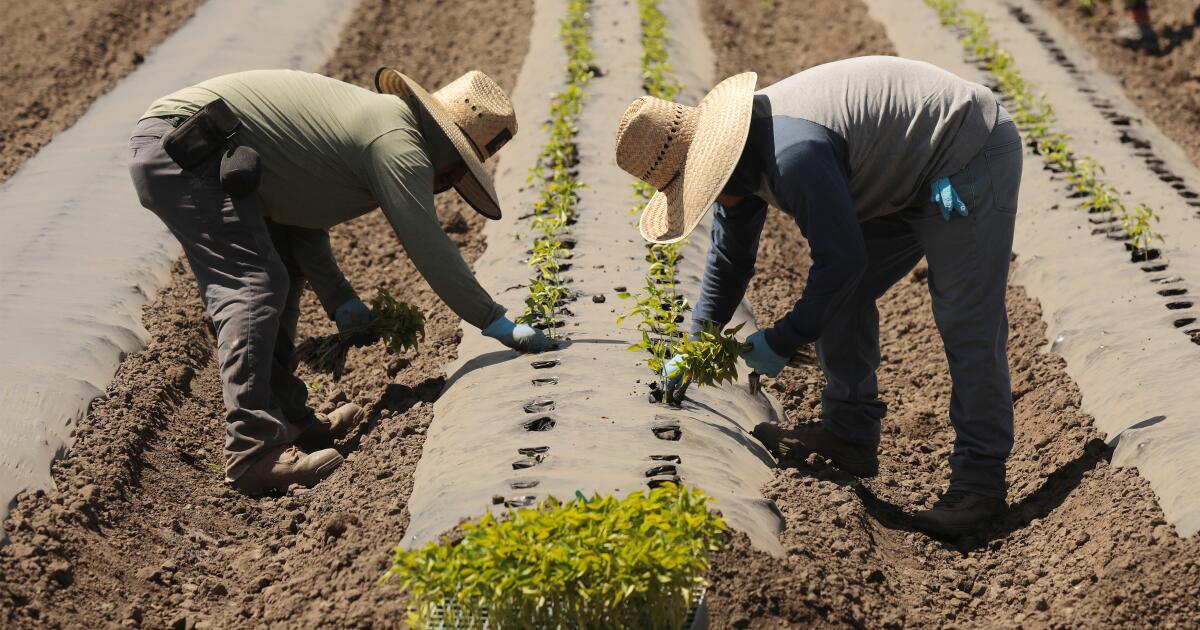By midmorning in the Central Valley, the light turns hard and white, bleaching the sky and flattening every shadow. The rows of melons stretch to the horizon, vines twisted low in cracked soil. Pickers move in the rhythm the crop demands — bend, twist, lift, drop — their long sleeves damp with sweat, caps pulled low, bandanas hiding heat-burned cheeks. Spanish drifts along the rows, a joke here, a warning there, carried in the heavy air.
These are the cruelest days of harvest, when the sun turns fields into slow ovens and the heat climbs before breakfast, holding on until the stars are out. By nightfall, the damage is done: another collapse in the dirt, another family handed a death certificate instead of a paycheck.
It’s an all-too-familiar old problem in California. Nearly 20 years ago, in the shadow of four farmworker funerals — Arvin, Fresno County, Kern, Imperial Valley — California enacted the nation’s first heat rules for basic worker safety: water, shade, rest. Mercies you’d think needed no law. My fellow lawmakers and I who wrote those rules, along with then-Gov. Arnold Schwarzenegger who signed them into law, believed they were enough. But two decades on, the grim reaper still walks the rows: 110 degrees, no tree, no tarp, a single water jug growing warm, its handle slick from dust and hands. Breaks denied, not from cruelty alone, but from the unrelenting clock of the harvest.
This is not a failure of the law itself, but of enforcement. Some treated the bill’s signing as the finish line instead of the starting gun. Inspectors are too few. Penalties too light. Investigations too slow. The state auditor’s latest report read like an obituary for Cal/OSHA’s credibility: outdated rules, missed chances, offices too empty to answer the phone.
Meanwhile the climate has turned meaner. Nights that once cooled now hold the day’s heat like a grudge. And the danger in the fields isn’t just the sun. Immigration raids now sweep through the Valley like dust storms — sudden, unannounced, merciless. For more than half of California’s 350,000 farmworkers, the greater threat isn’t heat stroke but a knock on the door before dawn or a traffic stop that ends with a vehicle full of workers detained and trucked to some distant site. The food that feeds the nation is pulled from the earth by people who work under triple-digit skies yet live in the shadows, where one complaint can cost them their job, their home, their freedom.
Twenty harvest seasons later, I’m calling for action — not another bill signing on the Capitol steps, but dollars, real and committed, and the regulations to match. With that will and funding, four simple fixes can turn promise into protection.
First, bring 21st century tools to the fields. In 2005, the “high-tech” solution was a plastic water jug in the shade and a flapping pop-up canopy. Today, for $50 — the price of two boxes of gloves — employers can deploy a wearable sensor clipped to a worker’s arm to track core temperature and heart rate, sending a warning before the body crosses the edge into heatstroke. That’s not Silicon Valley moonshot money. It’s pocket change for agribusiness, and for workers it could mean the difference between walking out of the rows or being carried out.
Second, enforce in real time. If a worker drops to one knee in the heat, the state shouldn’t hear about it days later in a report. Imagine a network linking growers, regulators and emergency crews to the same pulse of information — turning a slow, reactive system that documents tragedies into one that can act quickly and prevent many of them.
Third, train before the first row is picked. Ten minutes — no more — for workers to stand upright and learn, in their own language, the signs: dizziness, nausea, the creeping fog in the mind that means it’s time to stop. Not a photocopied handout in English tucked into an envelope behind a paycheck, not a rushed talk in Spanish at the field’s edge, but a verified safety course — certified by labor contractors and farmers alike. Knowledge here is as life-saving as water and shade.
Lastly, match the urgency we see in other arenas. While Cal/OSHA limps along, starved of staff and mired in red tape, Immigration and Customs Enforcement charges in the opposite direction — spurred by $170 billion in new funding, an immigration-enforcement and border-security blitz hiring thousands, dangling $50,000 signing bonuses, paying off student loans, waiving age limits, even pulling retirees back for double-dip salaries. That’s what happens when a government decides the wrong mission matters most. We pour urgency into chasing farmworkers from the fields, yet can’t muster the will to protect them in the heat. Until Cal/OSHA gets that same drive — inspectors recruited in every corner of the state, incentives to bring in a new generation, hurdles stripped away — the laws we wrote will remain a promise without a witness.
Some will say it’s too much, that the industry can’t bear the cost. But I’ve walked behind the hearses through Valley dust, stood in the gravel lots of farm town funeral homes, watched wives clutch work shirts as if they still held his warmth, seen children in Sunday clothes staring at the dirt. No budget line can measure that loss.
The Valley will keep feeding the nation. The question is whether we will keep feeding the graveyards too.
Once, by enacting heat safety rules, California declared that a life was worth more than a box of produce. If we let that promise wither in the heat, all we wrote back then was a press release. Government systems can fast-track billion-dollar projects, but until this much more affordable priority gets that kind of attention, the rules are just ink on paper, and the roll call of the dead just grows longer.
Dean Florez is a former California Senate majority leader, representing portions of the Central Valley.
